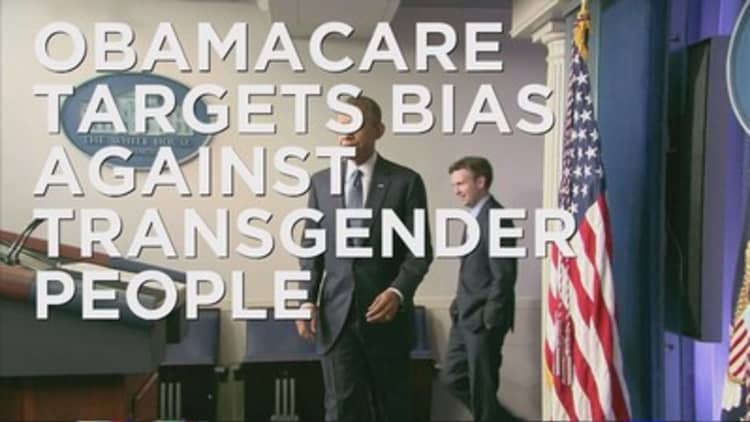
Many health providers would be barred from discriminating against transgender people or those with other sexual orientations under a newly proposed Obamacare-related rule, which also would extend discrimination protections to people with disabilities and limited English ability across a broad range of insurance programs.
The rule would cover all insurers who sell health plans on government-run Obamacare exchanges such as HealthCare.gov and state marketplaces as well as doctors and hospitals that treat Medicare and Medicaid patients, and other health programs or activities that receive funding from the Health and Human Services Department.
Employer-based insurance plans would also be affected if those insurers sell Obamacare plans.
The newly proposed protections for transgender people, officials said, come partly in response to the historical practices of some health insurance policies that categorically excluded coverage of all health care related to people transitioning between genders.
Transgender rights have received renewed attention this year on the heels of Olympic decathlon champion Caitlyn Jenner transitioning from her previous identity as Bruce Jenner.
Under the proposed rule, "Individuals must also be treated consistent with their gender identity, including access to facilities," HHS said in a press release. In other words, under the proposal, people would be able to use single-sex restrooms that match their identified gender.
Jocelyn Samuels, director of the Office for Civil Rights at HHS, said: "We are not requiring coverage for gender transition surgery. We are simply saying that insurers must apply nondiscriminatory treatment ... if they all exclude all gender identity treatment that will be a violation of the law."
As an example, Samuels said the department would question a decision by an insurer to deny coverage to a person for a hysterectomy—the removal of ones' uterus—if it were recommended by their doctor as part of a gender dysphoria diagnosis, and if that insurer covered hysterectomies for other diagnosed reasons.
"The other thing this means is that women would have to be treated equally to men in the health services they receive," said Samuels, who noted that the Affordable Care Act already has barred insurers from charging different prices for the same plans based on gender.
The proposed rule, in addition to implementing new protections against sex discrimination in a set of major health coverage programs overseen by the federal government, includes requirements for "effective communication" for people with disabilities, and "enhanced language assistant for people with limited English proficiency."
It "explicitly bars" insurers from any marketing practices or designing their health benefits in a way that discriminates "on the bases of race, color, national origin, sex, age or disability," the HHS press release said.
However, officials also are seeking comment on whether that area of the law, Section 1557, "should include an exemption for religious organizations and what the scope of such exemption would be."
HHS said the rule would advance "health equity through the Affordable Care Act."
"This proposed rule is an important step to strengthen protections for people who often have been the subject of discrimination in our health-care system," said HHS Secretary Sylvia Burwell.
"This is another example of this administration's commitment to giving every American access to the health care they deserve."
Samuels, head of the HHS civil rights office, told reporters during a call Thursday that, "Sadly, we have ample evidence that there continues to be a persistent problem with discrimination in the health-care industry."
"We get thousands of complaints every year," she said, adding that many of those are resolved through voluntary measures by providers and insurers after HHS intervenes.
She cited a case in a Brooklyn, New York, hospital, in which a transgender person was denied access to a facility because of their status. In another instance, she said, a male victim of domestic violence was denied services at a hospital "because he did not fit the traditional profile of a victim of domestic violence."
Other complaints, she said, involved a hospital that asked a woman to have her husband guarantee payments of her bills for treatment, when there were no such requests for wives to guarantee their husbands' bills. And there have been cases in which people with limited English or disabilities were not communicated with effectively about their treatment, Samuels said.
"Let me be clear, this rule does not require that any particular service be provided," she said. "It does require that insurers provide nondiscriminatory criteria to determining the services they are covering."
"We are not intending this rule to ban single-sex bathrooms or hospital wards or locker rooms, or any of those kinds of facilities," she said. "But we do anticipate that individuals will be provided access to those facilities consistent with their gender identity."
And, she said, "the rule makes clear that it prohibits discrimination based on sex stereotyping," or denying care to some because of a belief that their particular gender does not require such care.
The proposed rule is open for public comment through Nov. 6.




